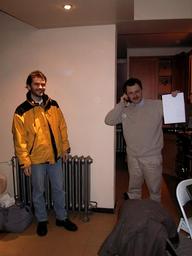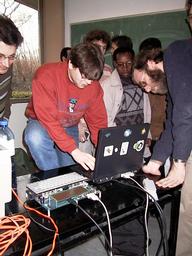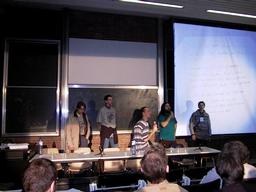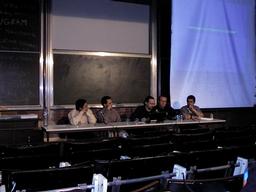


|
On Sunday morning Loic Dachary handed our host Peter Vandenabeele a diploma on the behalf of the "OSDEM community". Peter had generously arranged for about 20 people a place to sleep by offering to that purpose both his own apartment and the still empty new office premises of Mind.be, which was also sponsoring the event. Thanks a lot Peter! |

|
Peter de Schriver demonstrated Linux running on an embedded system test board using an ARM cpu. During his career Peter has been involved in several porting projects. His talk consisted of practical hints how to get started with new systems, mainly compiling the kernel and building the initial userland. Thanks to the framebuffer driver, the cute Linux penguin logo could be seen in the upper right corner of the lcd. |
Other topics Sunday morning included (among other things) presentations on Hurd and three big projects that touch a big number of people: Gnome, KDE and Debian. Due to them overlapping with each other I had to make a choice and went to hear David Faure on KDE as a development platform. In his own report David mentions many last minute preparations, but that couldn't be noticed in his talk, it was rather even a bit too clean to penetrate in my mind. David was naturally using Kpresenter for his slideshow while many others seemed to prefer MagicPoint.
One of Allison's remarks was how the role of the leader of a free software project differs from traditional project manager task. He has to deal with different cultures around the world and accept the fact that he cannot control people: "You are being given gifts and you cannot control how they are being given".
Jeremy had also funny experiences about dealing with companies not familiar with free software, in this case mostly the cost than the freedom aspect. He had many times faced the situation that they insisted on getting an invoice: sending one of null amount had solved the problem. At this moment RMS got a good laugh from the audience by showing a zero dollar banknote from his wallet. To some people software cannot be good if it doesn't cost at least 10 000 dollars. Also in this case the answer is simple - just take the money!

|
After getting the strategies sorted out it was the moment to sing together The Free Software Song. |
After lunch I went to listen a quantum computing talk which divided opinions: some didn't get much out of it, others were impressed. I think I understood some concepts but unfortunately wasn't smart enough to belong to the latter group. :)
The event had a good variety of nationalities present, with at least one man coming all the way from Australia. Rasterman, the well known author and contributor of various graphics related programs, was invited to tell about fast image and text rendering techniques. I heard later that it had been impressive, but spent my time learning about internationalisation issues (Alexander Bokovoy), as they are more closely related to what I am working on right now.

|
One of the main themes on Sunday was web content management. Three popular tools - Midgard, OpenACS and Zope - got their own presentations. In the evening, the representants of each of them and PHP creator Rasmus Lerdorf were behind the table to answer questions. |
The event was originally planned to be much smaller, the organisation grew as more and more people became interested. I was positively surprised how well it finally worked. While the Libre Software Meeting at Bordeaux last summer excelled in gathering together enthustiastic groups of specific subjects (music and medicine for instance), OSDEM was a conference. There were less sessions in parallel but more audience listening to each talk. Naturally there were plenty of possibilities to arrange meetings in smaller groups too, but the overall schedule was tighter than at LSM.
OSDEM was supported by several companies, especially VA Linux, which made it possible to keep the event free of charge for the participants. However, the commercial participation didn't show up in the form of big banners, only a few non-profit associations were allowed to have stands in the lobby.
The target audience of OSDEM were developers and advanced users, but the event attracted quite a few journalists too. Getting the message to mainstream media will help organising similar events in the future. I hope we meet again next year!
Last update 17.8.2001.